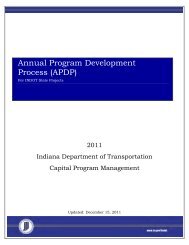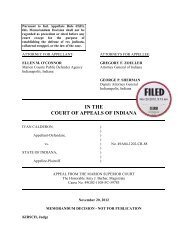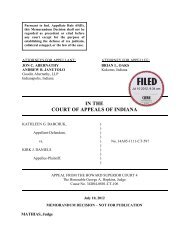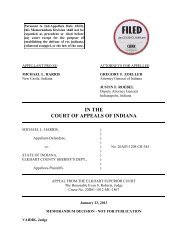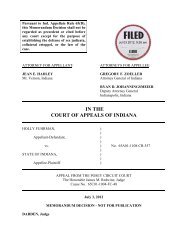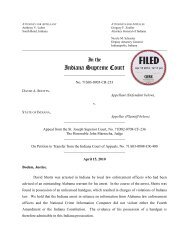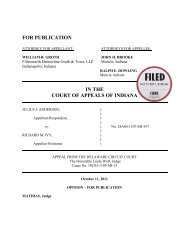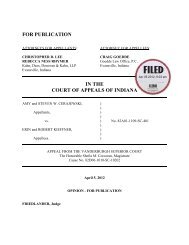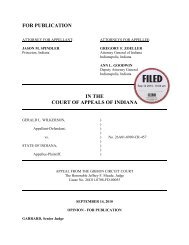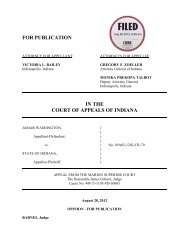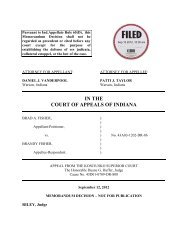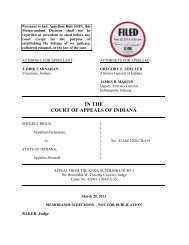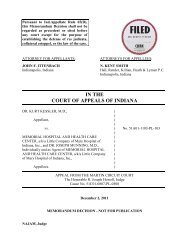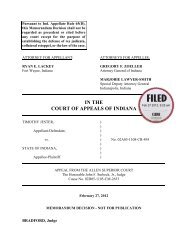Abby Allen and Walter Moore v. Clarian Health ... - State of Indiana
Abby Allen and Walter Moore v. Clarian Health ... - State of Indiana
Abby Allen and Walter Moore v. Clarian Health ... - State of Indiana
You also want an ePaper? Increase the reach of your titles
YUMPU automatically turns print PDFs into web optimized ePapers that Google loves.
or other legal relations” been interpreted to include a determination <strong>of</strong> a<br />
party‟s liability.<br />
In their complaint, the Banks requested the trial court to determine<br />
their “liability, if any,” under the applicable statutes. They did not request<br />
the court to construe a statute or determine a statute‟s validity. The<br />
determination <strong>of</strong> liability is not a proper ground upon which to seek<br />
declaratory relief. Accordingly, the Banks presented no set <strong>of</strong> facts under<br />
which they would be entitled to declaratory relief thereby making the<br />
dismissal <strong>of</strong> their complaint proper.<br />
To afford [I.C. §] 34-4-10-2 the interpretation espoused by the<br />
Banks would pervert the purpose <strong>of</strong> the Declaratory Judgments Act. The<br />
statute is remedial in nature <strong>and</strong> is intended to provide a remedy where<br />
none existed before. “The existence <strong>of</strong> another adequate remedy, however,<br />
does not preclude a judgment for declaratory relief in cases where it is<br />
appropriate.” The present case does not present facts which make<br />
declaratory relief appropriate because all the Banks seek is a determination<br />
<strong>of</strong> their liability. The Banks can defend the claims against them in<br />
Chantilly‟s conversion action in which liability will be determined.<br />
The Banks contend that they should be allowed to maintain their<br />
declaratory judgment action because they are entitled to remain plaintiffs in<br />
this controversy <strong>and</strong> Chantilly should be made to file a counterclaim. We<br />
find this assertion without merit. The Declaratory Judgments Act was not<br />
intended to reward the winner <strong>of</strong> a race to the courthouse. Rather,<br />
declaratory judgment actions should be allowed only if they “result in a just<br />
<strong>and</strong> more expeditious <strong>and</strong> economical determination <strong>of</strong> the entire<br />
controversy.” The most expeditious way to resolve this controversy is to<br />
allow Chantilly to pursue its conversion claim which will allow the trial<br />
court to determine whether the Banks incurred any liability.<br />
Id. at 11-12 (citations omitted).<br />
<strong>Clarian</strong>‟s reliance on Union Federal misses the point. Here, <strong>Allen</strong> <strong>and</strong> <strong>Moore</strong> are<br />
not merely seeking a declaration <strong>of</strong> their liabilities, as the banks in Union Federal were<br />
doing.<br />
<strong>Allen</strong> <strong>and</strong> <strong>Moore</strong> are seeking a declaration <strong>of</strong> their rights, obligations, <strong>and</strong><br />
corresponding liabilities under their contracts with <strong>Clarian</strong>. That is, <strong>Allen</strong> <strong>and</strong> <strong>Moore</strong><br />
seek to have the obligation to pay provisions in their contracts construed by the court.<br />
And it is well established that “declaratory judgment is appropriate to construe a contract<br />
22



